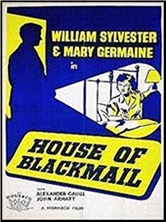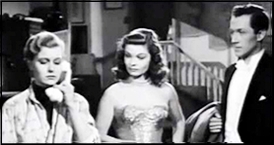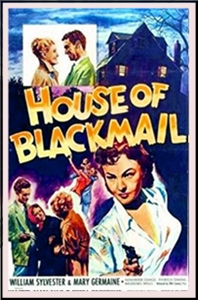Thu 15 Jul 2021
A Movie Review by David Friend: HOUSE OF BLACKMAIL (1953).
Posted by Steve under Mystery movies , Reviews[7] Comments
HOUSE OF BLACKMAIL. Monarch Film Corp., UK, 1953. William Sylvester, Mary Germaine, Alexander Gauge, John Arnatt, Denis Shaw. Story & screenplay by Allan Mackinnon. Director: Maurice Elvey.

A foolish young man named Billy Blane has forged a cheque for £200 and is threatened with arrest unless he pays £5,000 to the urbane and wealthy Markham. His artist sister, Carol (Mary Germaine) tries to get him out of it by agreeing to meet Markham in his old country house. On the way, she picks up a good-looking and garrulous hitch-hiker (William Sylvester) who calls himself Jimmy. The radio, meanwhile, speaks of an escaped convict from a nearby prison. Jimmy agrees to accompany Carol to the house and pose as her lawyer in an attempt to unnerve Markham.
There, they meet Markham (Alexander Gauge) and his two associates, an elderly Eastern European doctor (Hugo Schuster) and a sharp-tongued American (John Arnatt), also a Polish maid (Ingeborg von Kusserow) and a seedy, spying butler (Denis Shaw). After some sparring from Jimmy, Carol agrees to pay the money, but is unable to withdraw it from her bank until morning. The pair must remain until then and, with the windows electronically secured, there is no way to escape. During the night, Markham is murdered, and the killer could only have been someone staying at the house…
There is much intrigue and some witty dialogue to be enjoyed in this early fifties B-film, which reveals its small budget with its studio-bound setting and recycled score (at one point, it sounded like something from a Norman Wisdom film!). American William Sylvester is ebullient as Jimmy and, with his mid-Atlantic accent, could well have made an excellent Saint.

As usual, Alexander Gauge is wonderfully erudite as the disreputable Markham, another of his reasonable-criminal roles, while the British actor John Arnatt displays a convincing American accent as the man who takes charge. There is also some decent characterisation – for example, with Bassett the butler and his listening at keyholes and room of pin-ups – and much creepy sneaking about, which I always love.
Despite the gothic aesthetics, however, this is emphatically a mystery, not a thriller, and a pretty straightforward one at that. It’s about the characters’ interaction – not wanting to be alone or with any of the others either – and also keeps us guessing as to whether Jimmy is the escaped prisoner or not. The ending is neat, simple and reasonably satisfying, while everything before it is enjoyable too.
An average film, of course, but that should be no insult when such things are as fun as this.
Rating: ***

July 15th, 2021 at 7:44 pm
As David says an entertaining average film. Sylvester was a popular choice to play American and Canadian characters in British films probably best remembered today from 2001 A SPACE ODYSESSY.
He shows up on many of the British television series that played here in the sixties and seventies including at least one episode of the Saint.
Allan MacKinnon, who wrote the screenplay, aka Roger MacDougall, was not only a popular screenwriter dating back to the prewar era (THIS MAN IS NEWS, 10 DAYS IN PARIS, SLEEPING CAR TO TRIESTE all reviewed by me), but as MacKinnon one of the better British thriller writers of the Post War era with a number of fine books in the escape and hurried journeys genre popularized by Hammond Innes, Victor Canning, and Geoffrey Household. Only a few of his books made it into American paperback, but of that genre of writers in the Post War era he was one of the better practitioners the mystery element often given equal weight to the thriller and chase aspects in his works.
July 15th, 2021 at 10:56 pm
Is ‘Sleeping Car to Trieste’ the same as ‘The Sleeping Car Murders’ by Costa-Gravas?
Gad, much love for those Mediterranean mysteries. ‘Investigation of a Private Citizen’, ‘The Tenth Victim’, by Elio Petri for example
July 15th, 2021 at 11:02 pm
I don’t think I ever thought about the actor portraying ‘Dr. Heywood Floyd’. He was always just Dr. Heywood Floyd to me. Adroitly, perfectly cast.
Leonard Rossiter, in the same flick, well that’s a whole other story. Those astringent mannerisms, that attenuated personality. The way he sits in a chair. No one else is Leonard Rossiter.
Learned something new.
July 16th, 2021 at 10:45 am
I have discovered that the movie can be rented on either YouTube or Amazon Prime Video. Cost of the latter is $1.99. David’s review is positive enough that I may take the plunge.
(I’m not known as a big spender for nothing!)
July 16th, 2021 at 1:55 pm
Hi! How are You? Me fine, it is summer not winter here in Eastern Canada in the town of Edmundston, New Brunswick, Canada. This movie is available on Youtube, but it says 1 hour and 9 minutes but at IMDB it says 1 hour 12 minutes, here is the link of the video on Youtube
https://www.youtube.com/watch?v=N5p4ZQHMEQ8
The Actor and Actress still alive on this day is Ms Mary Germaine, She is 88 in 2021, all the others are all very sadly deceased, Lord God rest Their Souls.
Germaine in French can mean a Female Tough Leader and always like to be the Boss. Over here in town, where the 95% of the Population are French even though the name of Edmundston is English, People are to say that of a Woman Who likes to be the Boss all the time, in a derogatory manner, so not very flattering, but sometimes it is the truth. I do not want to say that Ms Germaine is like that, I just wanted to have fun with that name and to make You laugh a bit. Ms Germaine, maybe She is a marvellous Woman, I do not kn w Her at all and saw Her in a few films, at this is it. Take good care and be safe and wash Your hands and be careful everywhere and God Bless.P.S. Here is the link of Google maps where is Edmundston, from my home it takes only two minutes and we are in the USA. https://www.google.com/maps/place/Edmundston,+NB/@47.3670844,-68.3256077,2414m/data=!3m1!1e3!4m5!3m4!1s0x4cbda998c6ca03b9:0x7e879ce799f3d8b4!8m2!3d47.3690127!4d-68.3266741
The population is:16,580
July 16th, 2021 at 5:10 pm
Serge, I may not have laughed out loud, but you certainly did give me my very big smile for the day!
July 16th, 2021 at 8:50 pm
Costa Gravas SLEEPING CAR MURDERS was based on a novel by Sebastian Japrisot and quite different than the MacKinnon film focusing on a murder on a train investigated by Yves Montand with Simone Signoret one of the suspects. SLEEPING CAR TO TRIESTE is a 30’s film with Conrad Veidt about a Grand Hotel cast of characters involved in intrigue on a train. It was remade in the fifties.
All three are excellent examples of suspense set on or around a train.